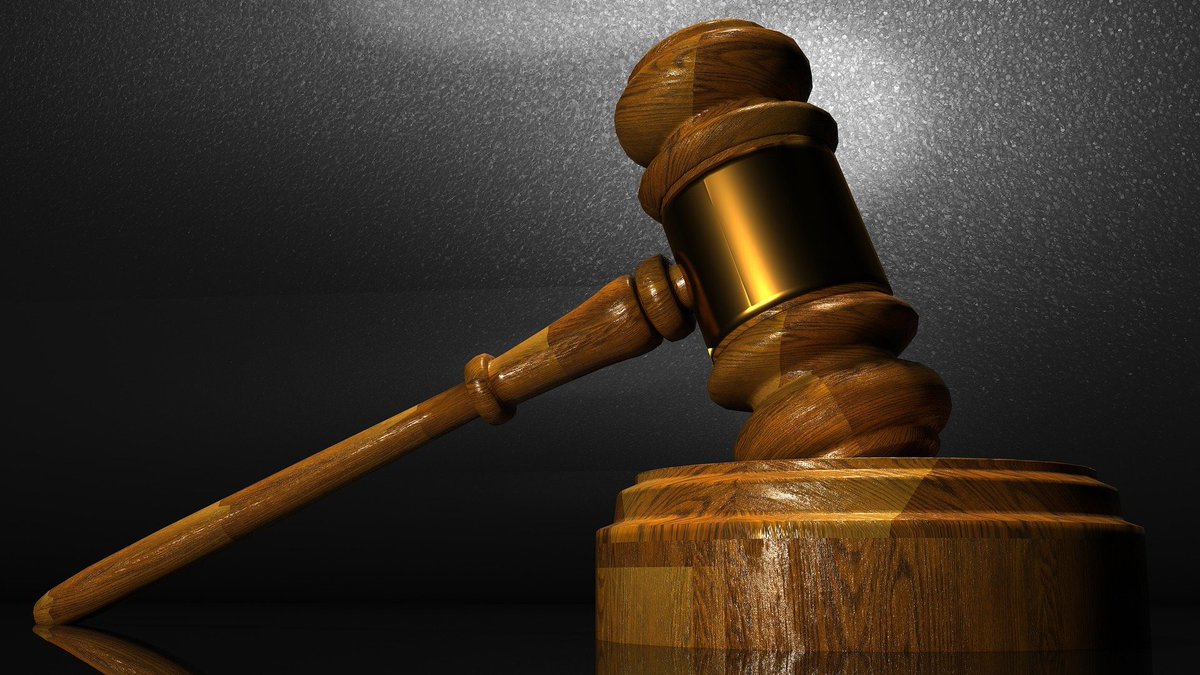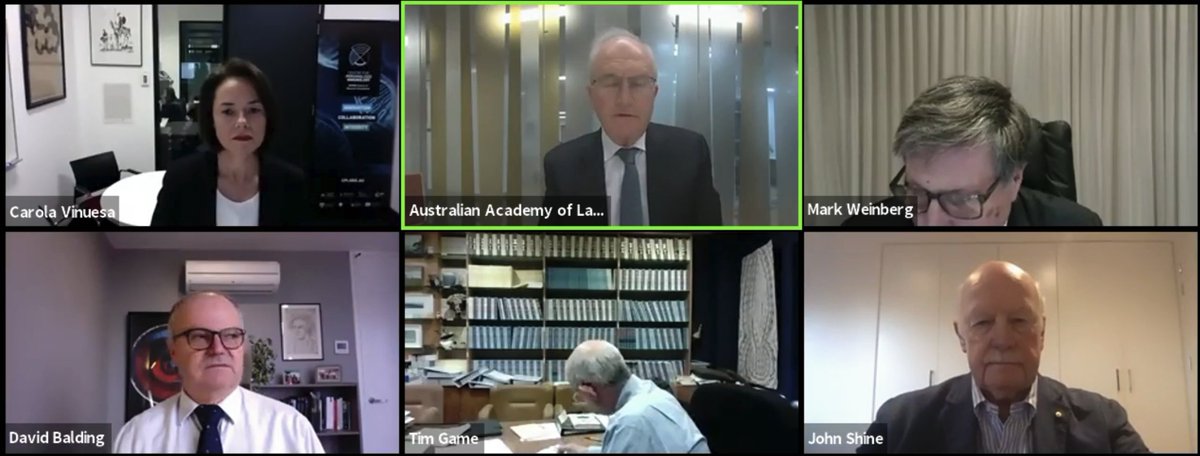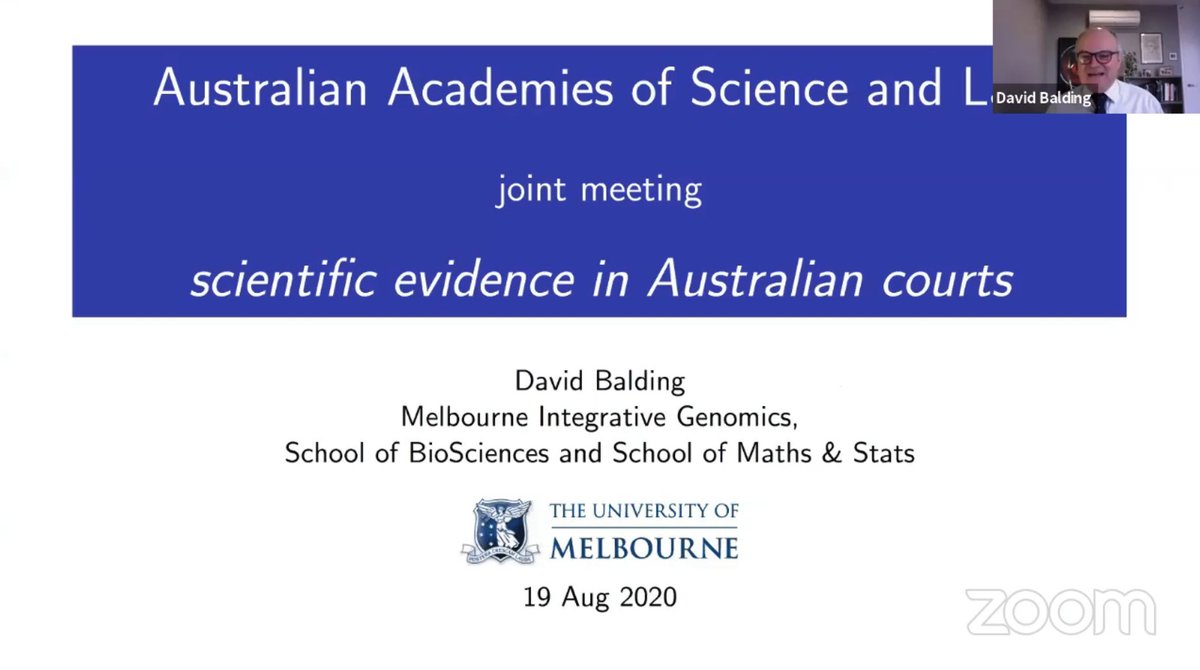Live now: The reception, quality and evaluation of scientific evidence in Australian courts.
A panel of experts on science and law will be questioned by The Hon Justice Virginia Bell of the High Court of Australia on the topic of scientific proof and legal proof.
#ScienceWeek
A panel of experts on science and law will be questioned by The Hon Justice Virginia Bell of the High Court of Australia on the topic of scientific proof and legal proof.
#ScienceWeek
Head to our website to watch live: https://www.science.org.au/news-and-events/news-and-media-releases/academy-gears-national-science-week
#ScienceWeek
#ScienceWeek
This is the third joint event between the Australian Academy of Law and the @Science_Academy.
Academy of Law President, Hon Justice Alan Robertson, is currently introducing our moderator for this event, the Hon Justice Virginia Bell AC, Judge of the High Court of Australia.
Academy of Law President, Hon Justice Alan Robertson, is currently introducing our moderator for this event, the Hon Justice Virginia Bell AC, Judge of the High Court of Australia.
Our moderator is now introducing our panel. This event will run with 15 min presentations from each panel member, prior to questions being gathered from the online audience.
The panellists are:
The panellists are:
The Hon Justice Mark Weinberg AO QC, Reserve Judge of the Supreme Court of Victoria and Formerly a Judge of the Federal Court of Australia
Professor Carola Vinuesa FAA, Professor of Immunology and Co-Director, Centre for Personalised Immunology, Australian National University
Up first, The Hon Justice Mark Weinberg AO QC, is talking on a paper that can be viewed at the below link: https://academyoflaw.org.au/resources/AALAAS%20-%20Juries,%20Judges,%20and%20Junk%20Science%20-%20Expert%20Evidence%20on%20Trial%2019%20August%202020.pdf
The Justice started discussing 'junk science' - but what's junk science? It could include evidence such as fingerprints that has historically had difficulty in definitively and scientifically proving the level of accuracy of a match.
Secondly the Justice is discussing the 'trial judge as gatekeepers' - and noting how trial judges need expertise themselves to ensure evidence is appropriately delivered and not overcomplicated for a jury to understand.
Now discussing 'DNA evidence' and how the 'CSI effect' has made DNA evidence perhaps over-trusted, especially in cases where only mitochondrial DNA is available.
Next up is Professor David Balding FAA, Professor of Statistical Genetics, The University of Melbourne
A crushing quote from the 2009 US National Research Council report on forensic science:
"no forensic method has been rigorously shown to [be reliable]"
Prof Balding reassures us that the situation isn't quite as bad as that sounds.
"no forensic method has been rigorously shown to [be reliable]"
Prof Balding reassures us that the situation isn't quite as bad as that sounds.
Bite mark evidence experts, when tested scientifically, were not infallible and it has been concluded that the method is unlikely to become scientifically valid.
But it's not the physical evidence that isn't reliable - it's the way we are able to interpret it.
But it's not the physical evidence that isn't reliable - it's the way we are able to interpret it.
Another example - fingerprints are extremely unique and useful for identifications. But the uniqueness isn't enough - it's the quality of the mark and how good the match is.
Any system that is a 'yes-no' match isn't likely to be good enough.
Any system that is a 'yes-no' match isn't likely to be good enough.
Why haven't the courts demanded good science? Why didn't forensic science self-correct?
Difficult questions - but perhaps hard to address.
Difficult questions - but perhaps hard to address.
What really matters is:
"evidence evaluation that is fair and comprehensible to courts"
The use of statistics and mathematics removes many of the above issues.
When we directly and openly assess the sources of uncertainty, then we can improve the reliability of evidence.
"evidence evaluation that is fair and comprehensible to courts"
The use of statistics and mathematics removes many of the above issues.
When we directly and openly assess the sources of uncertainty, then we can improve the reliability of evidence.
Next up is Professor Carola Vinuesa FAA, Professor of Immunology and Co-Director, Centre for Personalised Immunology, Australian National University.
Last year, Prof Vinuesa was approached by the inquiry into the Kathleen Folbigg case. New evidence from the inquiry has been published a little earlier today.
Prof Vinuesa is summarising the case, and outlining the work performed over the last 12 months that included genome sequencing DNA of blood samples from the Folbigg children at birth. They found a genetic mutation that has been linked with cardiovascular disease.
The inquiry was provided with this evidence by a world-leading authority on genetic causes of cardiac arrhythmia - but the case wasn't reopened as the diary evidence was considered more persuasive.
"Although the lethal cardiac mutation was only present in the two female Folbigg children, the remaining two male children had medical conditions that further hinted at natural causes of death."
Prof Venuesa continued saying that "it appears the weighting of evidence in law occurs retrospectively and by intuition, rather than by following a process that is set out prospectively."
Prof Venuesa suggest that an independent scientist with experience in the field of enquiry, could provide guidance to the judge and suggest the @Science_Academy could help field such 'helper scientists'.
In closing - Prof Venuesa hopes "the experience of giving evidence could be made less combative."
She felt intimidated throughout the recent hearing being forced to answer yes or no to many questions and being cut off repeatedly.
She felt intimidated throughout the recent hearing being forced to answer yes or no to many questions and being cut off repeatedly.
Tim Game SC, Senior Counsel Forbes Chambers, Principal Practice in Criminal Law Professor is commencing his speech with a comment on the gatekeeper role of the Judge
Understanding the science isn't the overwhelming problem for lawyers, but it's getting to the science.
Once the science is 'got at' then it is often very easy to determine what happened.
Once the science is 'got at' then it is often very easy to determine what happened.
The Hon Justice Virginia Bell AC providing a few comments on the Folbigg case highlighting the inquiry documents can be found publicly
https://www.folbigginquiry.justice.nsw.gov.au/
https://www.folbigginquiry.justice.nsw.gov.au/
The first Q: for complex science matters, should we move away from adversarial cross-examination to a panel that reaches consensus?
The proposition of the majority view wouldn't work - we need to achieve 'beyond reasonable doubt' and a small minority of experts indicates doubt
The proposition of the majority view wouldn't work - we need to achieve 'beyond reasonable doubt' and a small minority of experts indicates doubt
Q2: should expert witnesses be given legal and communications training prior to being asked to enter the court room?
Prof. Balding says there's currently little training and a lot to do to improve.
Prof. Balding says there's currently little training and a lot to do to improve.
Q3: Has the privatisation of forensic science in the UK help or hinder the legal practice?
Prof. Balding finds it hard to answer, comparing the large public institutes overseas, but also acknowledges the potential for radical innovation in the private sector.
Prof. Balding finds it hard to answer, comparing the large public institutes overseas, but also acknowledges the potential for radical innovation in the private sector.
Q4: Are there being changes being made to jury/judge training in forensics, statistics and biological science to facilitate fair evidence evaluation.
Things are changing - many law graduates have dual degrees in law/science and expect things to improve over time.
Things are changing - many law graduates have dual degrees in law/science and expect things to improve over time.
Thank you all for joining us - a close from Prof John Shine AC PresAA FRS, thanking once again the panel and the Hon Justice Virginia Bell AC for moderating this evening.
Our staff misspelt Professor Carola Vinuesa FAA’s name three times during our live tweeting tonight.
We normally have processes in place to minimise errors like this from happening, but those were not followed in this case.
This error shouldn’t have happened and we apologise.
We normally have processes in place to minimise errors like this from happening, but those were not followed in this case.
This error shouldn’t have happened and we apologise.

 Read on Twitter
Read on Twitter










